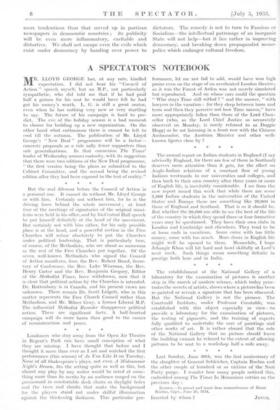But the real dilemna before the Council of Action is
a personal one. It cannot do without Mr. Lloyd George or with him. Certainly not without him, for he is the driving force behind the whole movement ; at least four of the meetings of signatories of the original mani- festo were held in his office, and by his Central Hall speech he put himself definitely at the head of the movement. But certainly not with him either, for his only possible place is at the head, and a powerful section' in the Free Churches will refuse absolutely to put the Churches under political leadership. That is particularly true, of course, of the Methodists, who are about as numerous as the rest of the Free Churches put together. Of the seven well-known Methodists who signed • the Council of Action manifesto, four, the Rev. Robert Bond, Secre- tary of Conference, the Rev. Luke Wiseman, the Rev. Henry Carter and the Rev. Benjamin Gregory, Editor of the Methodist Times, have withdrawn, now that it is clear that political action. by the Churches is intended. Dr. Rattenbury is in Canada, and his present views are unknown. There remain Dr. Scott Lidgett, who in this matter represents the Free Church Council 'rather than Methodism, and. Mr. Milner Gray, a former Liberal M.P. The influential Methodist Recorder disapproves political action. These are significant facts. A half-hearted campaign will do more harm . than good to the causes of reconstruction and peace.














































 Previous page
Previous page